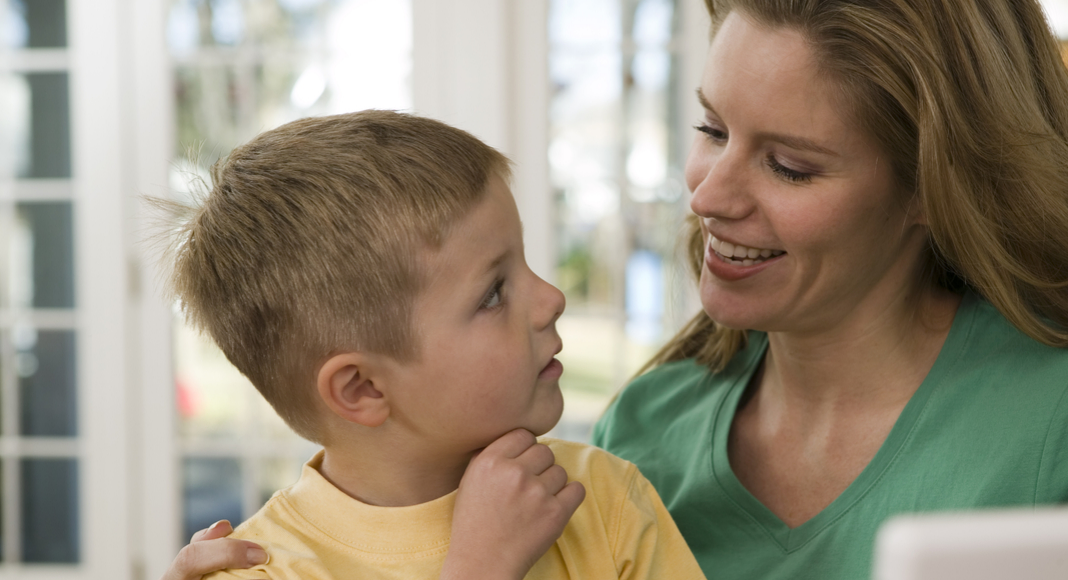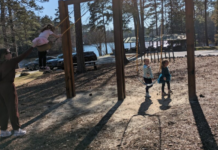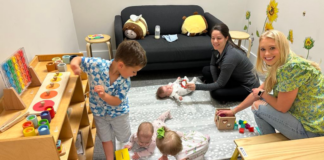The basics of parenthood are pretty cut and dried: Feed your kids. Clothe them. Teach them. Get them medical attention when they’re sick. But beyond those basic survival instincts, each parent is different.
We all have different philosophies, whether toward parenting or toward life in general, that affect how we raise our children. And what we say to them. With these thoughts in mind, there are five things I’ll never say to my son, and five more I say as often as possible.
5 Things I’ll Never Say to My Son

1. That’s nothing to cry about
We are deep in the “three-ager” years when emotions are close to the surface and tears seem to appear at a moment’s notice. Sometimes Will’s reactions seem way out of proportion to an event, like the time he sobbed because he’d thought we were going to sit on a restaurant’s patio, and instead we sat inside.
It takes a lot of soothing and listening to calm him down, but I view that as time well spent. I’m teaching him that it’s okay to express feelings, and that emotions are not to be feared.
We’ve had several discussions about how babies cry because they don’t have words for what they’re feeling. But even when babies grow up to be big kids or adults, sometimes there aren’t words for their feelings, and then their feelings come out as tears.
My husband and I are trying to teach Will how to find words to express his feelings, but if he can’t and tears come instead? We’ll let him express his feelings the best way he knows how, even if they don’t make sense to us.
2. I’m so fat
If he pays attention, Will knows that my body is different from many other moms‘, that my belly is squishier and my chest is softer. But he doesn’t know that this is called being fat, and he doesn’t know that you’re supposed to hate a fat body. And I will not be the one to teach him that.
I say plenty of ugly things about my body to myself, in my own head. But in front of my son, I talk about how I try to keep my body healthy and strong; how bodies come in all shapes and sizes; and how some bodies work differently than others and that’s okay. I want Will to respect all people’s bodies, and that means that first I have to respect my own — at least within his earshot. (I’m working on the rest of it.)
3. You don’t want that
I don’t always understand my child’s logic, but I respect him enough to try. If Will decides he wants to wear a sweater in July, which is better: suffering through a tantrum when I put my (sensible) foot down, or letting him experience the (sweaty) logical consequences of his choice?
For more serious issues — refusing his seatbelt, say — it’s a little different. I can’t let him do what he wants, but I can acknowledge that he does want it. And when there’s time, we can talk about why he wants it, and why I can’t let him do that.
This may seem silly, spending valuable time on the whims of a child, and I suppose on some level it is. But I see it as good practice for his later years. When he’s convinced, at age 18, that he can make it as a jockey (despite the fact that he’ll likely be over 6 feet), it won’t do any good to try to talk him out of his desires. A respectful conversation — even if I think what he wants is crazy — is more important than me imposing my will on him.
4. That toy is for girls
Long before I had children, I knew I didn’t want them to be hampered by gender constructs. If my daughters genuinely liked pink and lace and princesses, fine; if my sons chose primary colors and loud trucks and mud, that would be OK. But I wasn’t going to force those interests on them — or deny them different ones — just because of their gender.
My husband and I have done our best to let Will find his interests on his own. And he’s turned out to be fairly gender-conformative. He likes trucks and trains and Legos; he has a “dumpsite” in the backyard where he moves his construction vehicles back and forth. But he also likes ballet (at least a 3-year-old’s version of it), a baby doll (named Baby, of course), and a treasured pair of pink princess gloves. I would never tell him he can’t enjoy pirouetting around the house, or that he can’t wear his pink gloves.
As he gets older, he’ll learn that not many boys do ballet, or that those gloves were originally intended for a girl. He may decide to drop those interests in favor of more “boyish” things; he may decide that it’s fine for boys to enjoy ballet and pink. Or he may lose interest in these things altogether, all on his own. The point is that it’ll be his decision. I would be doing him harm by forcing him to meet someone else’s standard of what a boy is. His standard is the only one that matters.
5. You’re so smart
By all indications Will actually is smart. (I know, I know: What parent doesn’t think that?) But that’s not all he is. If he has a good vocabulary when he’s older, or if he masters math and science easily, it won’t be only because he’s smart. It’ll also be because he’s inquisitive and tenacious and creative and hard-working, and I want him to know the full range of his capabilities.
I was a smart child — I was reading chapter books at four, and got good grades easily — but because so many things came easily to me, I thought everything should. I never learned to study — college was a rude awakening. And to this day, if I have to work hard at something, I get panicky and start blaming myself for not being smart enough. And I’m not alone. A study at Columbia University (read about it in an excerpt from the best-seller Nurture Shock) shows that children who are labeled smart shy away from difficult tasks — tasks that are well within their capabilities if they just try.
So Will may be smart, but he won’t hear it from me. Instead, I’ll praise his attention to detail, his good memory, his good comprehension, and his analytical skills. And he’ll know what he is good at rather than just what he is.
5 Things I Say to My Son as Often as Possible
 1. I love you, but I don’t love your behavior
1. I love you, but I don’t love your behavior
I’d love it if I never had to say this one again because it would mean we’d seen the end of tantrums and fits and sulks. But since Will is an actual human child, it’s going to stay part of my arsenal.
When my husband and I are putting him in a timeout or speaking to him sternly, we invariably end by telling him that even though we don’t love what he did, we do love him. It’s important that he know we’ll love him no matter how bad his behavior; that even if he someday breaks a dish or clogs the toilet or (heaven forbid) crashes the car, we won’t stop loving him.
2. You have such a good daddy
I stole this one from my mom. Whenever she mentioned that Dad would be home late because he had a church vestry meeting, or that he was going to be mowing the grass on a hot summer day, she ended by telling my brother and me what a good daddy we had. We didn’t need to be convinced. Our dad was smart and kind and upstanding and funny, and we loved him to pieces (and still do). But it was important that we hear that our mom thought so as well.
As an adult, I’ve seen that not every child has a good daddy, so I make sure Will knows that he does. (I checked with my husband, and he tells Will he has a good mommy, too. Whew!)
3. I don’t know; let’s look it up!
As Will gets older, he asks more and more questions: How did the birds build that nest? Where does my food go after my tummy? What’s inside a rock? I answer as best I can, but sometimes I’ve just hit the limit of my knowledge — particularly when it comes to science. (Oh, Mr. Frogge, I am so sorry; but it’s been a long time since high school physics, and we both knew I wasn’t going to be Marie Curie.)
It’s tempting to make up an answer, but it’s more honest to tell him that I just don’t know. And then we try to find the answer ourselves, either online or in a book or by asking someone else. I want to show him it’s okay not to have all the answers, and that the search for the answer can be fun.
4. I had a good time with you today
As Will gets older, spending time with him becomes less about taking care of his needs and more about enjoying his company. He’s such a good little pal; he’s funny and inquisitive and perceptive. Even if our day consists of only boring errands, his cheerful chatter usually makes them fun. So I make sure to tell him when we have an especially good day. I want him to know that I value his companionship, that I value him, more than just his good behavior at the post office or his help unloading groceries.
5. Would you like to help me?
When I envisioned being a mom — particularly a stay-at-home mom — I always imagined myself and my kids in the kitchen. I grew up with a mother who cooked dinner every night and loved to bake, and my brother and I were cooking Saturday morning pancake breakfasts by ourselves before I was 10.
I’m no foodie, but I’m confident in the kitchen, and I wanted to share that with my children. So it’s one of my not-so-secret joys that Will loves helping me the way I helped my mom.
We have our kitchen rituals: He spreads the cheese on a tortilla for his quesadilla lunch; when we make muffins or cake, he pierces the egg yolks with a fork and beats them gently (“make big, soft circles”). And in the 5 o’clock witching hour, when preschooler fatigue sets in and the answer to everything is a cranky “no!”, the answer to “would you like to help me make dinner?” is usually a cheerful “yes!” I could tell you that I’m setting the stage for him to be self-sufficient, or to learn about good nutrition, and those things may be true. But mostly, we just have fun.















LOVE LOVE LOVE this! 🙂